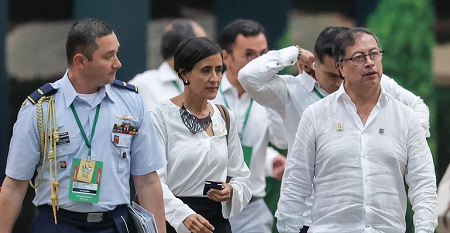Amazon Nations Reject Colombia`s Call to End Oil Extraction, Fail to Agree on Deforestation Goal
"To avoid the point of no return," argued Colombian President Gustavo Petro, "we need an ambitious transnational policy to phase out fossil fuels."
The leaders of eight Amazon nations closed out a two-day summit in Brazil on Wednesday without reaching a shared agreement to end deforestation by 2030, a failure that stemmed in part from disputes over oil extraction in the critical ecosystem.
Colombia, represented by leftist President Gustavo Petro, pushed for an end to oil development in the Amazon, whose status as a key carbon sink has suffered severe damage in recent years due to the deliberate clearing of trees, corporate exploitation, and runaway planetary warming.
"Are we going to let hydrocarbons be explored in the Amazon rainforest? To deliver them as exploration blocks? Is there wealth there or is there the death of humanity?" Petro asked in a speech last month. Colombia is home to roughly 10% of the Amazon.
Colombia`s fellow Amazon nations rejected Petro`s call.
A joint declaration issued by Bolivia, Brazil, Colombia, Ecuador, Guyana, Peru, Suriname, and Venezuela states that the South American countries agree "urgent action" is needed to "avoid the point of no return in the Amazon" and combat deforestation, which has surged in recent years.
But the declaration stops short of a cooperative pledge to end deforestation entirely by 2030 and contains no mention of fossil fuels. Individual nations, including Brazil and Colombia, have pledged to take their own steps to end deforestation by decade`s end.
Colombia this week also became the first country to back an Indigenous-led call to protect at least 80% of the Amazon by 2025.
"Indigenous territories and Indigenous rights are a critical tool for the long-term protection of Amazonia," said Alicia Guzman, Amazon program co-director at Stand.earth. "As Colombia and other countries move forward to protect the Amazon, protecting current and establishing new Indigenous Territories will be an essential element of protecting 80% of the Amazon by 2025. Amazonia for Life: Protect 80% by 2025 centers the importance of Indigenous Territories, and also encourages national-level debt forgiveness, local economic development, and an end to extractivism."
Environmental groups voiced outrage that Amazon countries were unable to agree to cooperate on ending deforestation by 2030.
"Temperature records are broken every day," said Márcio Astrini of the Climate Observatory. "It`s not possible that under those circumstances, the eight presidents of the Amazon nations can`t include a line in the declaration stating, in bold letters, that deforestation needs to be zero, that it won`t be tolerated anymore."
"To avoid the point of no return, we need an ambitious transnational policy to phase out fossil fuels."
Reutersreported Wednesday that "tensions emerged in the lead-up to the summit around diverging positions on deforestation and oil development."
"Bolivia and Venezuela are the only Amazon countries not to sign onto a 2021 agreement among more than 100 countries to work toward halting deforestation by 2030," the outlet noted. "A Brazilian government source told Reuters in the lead-up to the summit that Bolivia, where forest destruction is surging, is a hold-out on the issue."
Reuters added that "Brazil is weighing whether to develop a potentially huge offshore oil find near the mouth of the Amazon River and the country`s northern coast, which is dominated by rainforest."
Petro has implored Lula—who has overseen a sharp decline in deforestation—to rule out the fossil fuel project, which would be led by Brazilian oil giant Petrobras.
In an op-ed for the Miami Herald last month, Petro warned that "even if we get deforestation under control, the Amazon faces dire threats if global heating continues to climb. To avoid the point of no return, we need an ambitious transnational policy to phase out fossil fuels."
Researchers have estimated that one in nine tanks of gas, diesel, or jet fuel pumped in the U.S. state of California comes from the Amazon.
"To avoid the point of no return," Petro argued, "we need an ambitious transnational policy to phase out fossil fuels."
To that end, Petro called on "Amazon countries and our partners in the `Global North` to commit to phasing out fossil fuel development, and to do so in a way that protects our right to a just transition to a post-carbon world."
Photo: Gustavo Petro, president of Colombia (R), walks through the Hangar Convention Center during the Amazon Summit in Belem, Brazil. Source: Filipe Bispo/Picture Alliance via Getty Images.
| Themes |
| • Access to natural resources • Climate change • Commons • Destruction of habitat • Energy • Extraterritorial obligations • Indigenous peoples • Public policies • Public programs and budgets • Regional |














